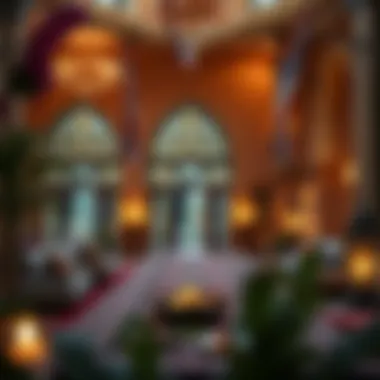Iftar Time 2023: Cultural Importance and Practices


Intro
Iftar, the meal that marks the end of the daily fast during Ramadan, holds a profound significance in the lives of millions around the globe. However, its meanings and practices can vary widely based on cultural contexts and geographical locations. In 2023, as communities come together to break their fast, the observances surrounding iftar reflect deeper traditions, family ties, and the intricate relationship between religion and contemporary life.
In recent years, the experience of iftar has evolved, intertwining with local economic dynamics, particularly in vibrant urban centers such as Dubai. The timing of iftar itself becomes a daily ritual that shapes not only individual lives but also broader societal elements. As the sun sets, leading to the call for iftar, countless families gather around tables laden with dates, savory dishes, and refreshing drinks, a moment of unity against the backdrop of a sprawling city.
This article will take you through an insightful exploration of iftar's timing and associated cultural practices in 2023, examining how they shape communal experiences. Additionally, we will delve into its intersections with the Dubai real estate market, gaining insights into how these observances influence lifestyle choices and property investment decisions in this rapidly evolving metropolis. By blending tradition with modern-day realities, we illustrate how the sacred observance of iftar impacts not just spirituality but also economic initiatives and housing trends.
Prelude to Iftar in
Iftar holds a special place in the hearts of millions during Ramadan, and 2023 is no exception. This meal, which breaks the fast after sunset, is not just a ritual; it embodies a deep significance that weaves together faith, culture, and community. As this sacred time approaches each day, the anticipation builds, and this article aims to illuminate the various facets surrounding Iftar this year.
Understanding Iftar
At its core, Iftar represents the culmination of a day-long fast, where Muslims around the globe abstain from food and drink from dawn until dusk. The act of fasting, while challenging, serves multiple purposes – spiritual reflection, self-discipline, and increased empathy for those in need. With the moment the call to prayer sounds, families come together, often seated around a table laden with dates, water, and a variety of traditional dishes, signaling not only nourishment but also a re-connection to one another.
For many, the breaking of the fast is marked by the simple act of eating a date, which is a practice derived from the traditions of the Prophet Muhammad. This practice underscores the importance of community and shared experiences during Ramadan. In 2023, as the world faces various challenges, the significance of gathering around the table for Iftar becomes even more poignant, providing comfort and solace in shared faith.
Historical Context
To truly appreciate Iftar in 2023, one must peel back the layers of history. The tradition traces its roots to the earliest days of Islam, where the Prophet Muhammad and his followers observed the fast as prescribed in the Quran. This historical backdrop illustrates that Iftar is not merely a culinary event but a deeply religious practice, carrying centuries of significance. Over the years, cultures across the globe have embraced their unique iterations of Iftar, often blending regional cuisines with traditional foods.
In many Middle Eastern cultures, meals prepared for Iftar commonly include lentil soup, kebabs, and a variety of desserts, each with roots in historical trade and agricultural practices. As the Islamic Ummah expanded, so did the culinary practices associated with Iftar, creating an incredible tapestry of flavors that define the meal today. Local ingredients and historical influences contributed to the food choices in each region, enhancing the communal experience during this cherished time of the day.
In essence, understanding Iftar and its historical context enriches not just the experience of breaking fast but also the cultural empathy that binds the community together. In 2023, as people gather to partake in this sacred meal, they bring with them both the weight of tradition and the bright promise of connection.
Timing of Iftar in
The timing of iftar in 2023 holds significant relevance not just for those observing fasts during Ramadan, but also for various sectors of society, including real estate and hospitality. Understanding when iftar occurs can impact everything from meal preparations to daily business operations, and thus it’s essential to grasp the implications of this timing. The rhythm of life during Ramadan revolves around these moments of breaking fast; knowing the exact time makes the experience richer, more communal, and more meaningful.
Significance of Daily Timing
The daily timing of iftar is crucial as it delineates the fasting period each day. Traditionally, this moment is marked by the call to prayer at sunset, a time when many Muslims gather either at home or in mosques to share their meals. The significance lies not just in the act of eating—it is also a time of reflection, devotion, and communal participation often consisting of dates and water to start.
Timing also allows for the synchronization of activities, including when families and friends come together to eat. For instance, in the UAE, iftar signals the end of the day’s fasting from dawn until dusk; it’s an opportunity to connect with others, reinforcing social ties. This communal aspect of breaking fast is a cornerstone of the Ramadan experience, and it inspires significant social gatherings, both intimate and larger in scale, such as iftar tents in public spaces.
Regional Variability
The timing of iftar is not a one-size-fits-all phenomenon. It can vary vastly between regions due to geographical differences. Latitude and longitude play a critical role; places farther north experience longer fasting hours in summer, whereas regions near the equator have relatively constant fasting hours.
For example, in the northern reaches of Europe, the sun may set quite late, leading to extended periods of fasting compared to countries like Egypt, where sunset occurs much earlier. As a result, Muslims in these different regions adapt:
- In Scandinavia, with its long summer days, many choose to follow the local timing or rely on a nearby region's schedule where the fasting duration is more predictable.
- In Arab countries, the timing is typically more straightforward, operating within more consistent sunlight patterns thanks to their closer proximity to the equator.
Methods of Determining Iftar Time


Various methodologies exist for determining the time of iftar, and accuracy is absolutely essential. One common method is using a calendar or mobile applications designed explicitly for Ramadan, which consider geographic location to provide the exact time of sunset. These digital tools are widely used today for reliability and convenience.
Another method involves observing the sun's position. Many Islamic communities adhere to traditional calculations based on local sunrise and sunset observations. Specific mosques may also announce the iftar time through speakers or communal gatherings, fostering that sense of community.
Importantly, halal food outlets and restaurants sufficiently adjust their schedules to reflect the timing of iftar, often preparing specially tailored menus to cater to the crowds that flock to dine and celebrate the breaking of the fast after a long day.
In summation, understanding the timing of iftar in 2023 is more than just knowing when to eat. It affects everyday scheduling, social interactions, and even economic activities within the community, reflecting the deeply woven fabric of culture and tradition that surrounds this important aspect of Ramadan.
Cultural Practices Surrounding Iftar
Cultural practices surrounding iftar provide a unique lens through which one can appreciate the significance of this daily event during Ramadan. Rather than merely a meal to break the fast, iftar acts as a vibrant tapestry of tradition, social interaction, and communal spirit. It resonates well with locals and visitors alike, helping to bridge cultural divides. Whether it's sharing a commonplace meal or engaging in elaborate feasts, these practices encapsulate the essence of togetherness, charity, and the celebration of shared faith.
Traditional Foods of Iftar
The culinary aspect of iftar is integral, offering a wide variety of local dishes and drinks that cater to regional tastes. In many places, dates and water serve as the initial food and drink to mark the end of the fast, an age-old practice that stems from traditions observed by the Prophet Muhammad.
As the sun sets, tables fill with a stunning array of food:
- Harees: This dish, made of wheat and meat, is a particular favorite in the Gulf countries.
- Samosas: These are commonly stuffed with meat or vegetables and are a staple across many cultures.
- Fattoush Salad: This refreshing salad features mixed greens and toasted bread, providing a crisp contrast to the heavier dishes.
- Qamar al-Din: A refreshing apricot juice often enjoyed during iftar.
These foods not only provide physical nourishment after a day's fast but also symbolize hospitality and sharing. Families often prepare special recipes that have been passed down through generations, turning the iftar meal into an experience of cultural preservation.
Communal Gatherings and Socializing
Iftar meals have a strong communal aspect, transforming solitary fasting into a social affair. This event fosters an environment where friends, family, and even strangers come together, emphasizing the spirit of unity that Ramadan promotes.
In many neighborhoods, it’s common to see large gatherings in community centers or parks, where everyone brings a dish to share. Iftar tents often pop up during Ramadan, offering free meals to those in need – a wonderful expression of generosity.
The conversations shared over iftar are often rich with laughter and stories, creating bonds that transcend social barriers. This sharing of food fosters solidarity and reinforces community ties, which is especially significant in a multi-cultural city like Dubai.
Charitable Acts during Iftar
Charity is a fundamental principle of Islam, and during Ramadan, the practice amplifies. Many individuals and organizations step up their philanthropic efforts, especially during iftar. From distributing free meals to the less fortunate, to organizing fundraising events, the spirit of giving permeates the atmosphere.
People engage in various charitable acts, which can include:
- Providing meals for local shelters.
- Contributing to food drives aimed at helping impoverished families.
- Offering sponsorships for children’s education or health care.
These charitable acts are not merely gestures; they reflect a deeper understanding of empathy and community responsibility. They remind us that sharing Ramadan’s blessings enhances the outcomes for both the giver and the receiver, reinforcing Islam’s core teachings around generosity and kindness.
By integrating these cultural aspects into the Iftar experience, individuals not only fulfill their spiritual obligations but also nurture their relationships and deepen their understanding of community cohesion. This blend of food, connection, and charity exemplifies why iftar holds such a cherished spot in the hearts of millions around the world.
Health Considerations
When engaging in Ramadan observances, the significance of health cannot be overstated. Iftar, the meal that breaks the fast, presents an opportunity not just to enjoy a feast after a day of abstaining from food and drink, but also to pay attention to what is consumed. Maintaining health during Ramadan is paramount, particularly because fasting affects both emotional and physical well-being.


Nutrition for a Healthy Iftar
Nutrition is the backbone of a healthy iftar. It is essential to strike a balance between indulgence and health, as the consequences of overeating or consuming the wrong foods can ripple through both body and spirit. Here are a few guidelines to consider when preparing and enjoying iftar:
- Prioritize Nutrient-Dense Foods: Focus on whole grains, lean proteins, fresh fruits, and vegetables. Dishes like grilled chicken with quinoa and a side of salad provide not only energy but also essential vitamins and minerals.
- Avoid Heavy Frying: Rich, fried foods might seem appealing but can lead to sluggishness and digestive discomfort. Instead, consider baked options or steaming for a lighter meal.
- Balance is Key: Ensure your plate has a good mix of macronutrients—carbohydrates, proteins, and fats. This can enhance digestion and provide sustained energy.
- Watch Portion Sizes: It’s easy to go overboard when breaking a fast, but listening to one’s body and acknowledging hunger signals is vital. Starting with a small serving can help gauge actual hunger levels.
Notably, incorporating traditional dishes can add cultural richness to the meal while still being health-focused. For instance, a lentil soup, commonly enjoyed in many cultures, is both a staple and a nutritious option for starting the meal.
Hydration and Digestive Health
Hydration is another crucial consideration during iftar. After a long day of fasting, the body craves hydration, but it is vital to rehydrate wisely.
- Start with Water or Homemade Juices: Breaking the fast with water is recommended. Alternatively, fresh juices devoid of added sugars can serve as nutrient-rich hydration.
- Avoid Excessive Sugary Drinks: While sugary beverages can be tempting, they can lead to quick spikes and crashes in energy levels. Opting for moderate consumption of natural sweeteners, such as honey in a warm drink can satisfy cravings without the guilt.
- Mindful Eating for Digestive Health: Transitioning from fasting to feasting can be jarring for the digestive system. Eating slowly and chewing food thoroughly can help ease digestion. This traditional practice also allows individuals to savor the flavors and gratitude of the meal.
Additionally, the importance of probiotics can’t be overlooked. Including fermented foods like yogurt in your iftar can aid in digestion. The presence of good bacteria helps in maintaining gut health, which is paramount during the fasting month.
"Healthy eating practices during Ramadan are not about deprivation, but rather about mindful choices that honor the body and the spirit of the month."
In summary, health considerations during iftar extend beyond merely satisfying hunger. By prioritizing nutrition, hydration, and mindful eating practices, individuals can enhance their well-being and truly honor the observance of Ramadan. A better understanding of these aspects can lead to healthier habits that can be carried on even beyond the holy month, creating a lasting impact on one's lifestyle.
Iftar's Impact on Daily Life
Iftar, as the breaking of the fast during Ramadan, is not solely a personal practice but a significant cultural event that ripples through society, influencing daily routines and behaviors. As people around the world come together for this cherished moment, various aspects of their lives adapt to accommodate the unique customs of this month. Understanding how Iftar impacts daily life helps underscore its role not just in personal spirituality, but also in broader societal dynamics that extend to work, leisure, and even economic factors.
Business and Work Hours Adaptation
The timing of Iftar necessitates adaptations in business and work schedules. In many countries, including parts of the Middle East and South Asia, work hours shift to accommodate employees' needs for fasting. Companies often adopt more flexible work arrangements, allowing for earlier departures or extended breaks leading up to sunset.
This shift creates a peculiar rhythm to the daily grind, where traditional nine-to-five durations are replaced with shortened hours. As a result, productivity may not always dwindle; instead, businesses might find elevated morale and camaraderie as employees bond over the shared experience of fasting. For instance, in Dubai, a diverse city with strong expatriate communities, the spirit of Ramadan is palpable. Many organizations, recognizing the importance of Iftar, provide catered meals, fostering a sense of belonging and community among workers.
Companies that respect cultural practices, such as accommodating Iftar, often see happier employees, leading to increased loyalty and lower turnover rates.
Leisure Activities during Ramadan
As the sun dips below the horizon, the transition from day to night ushers in a flurry of leisure activities that enhance the Iftar experience. Families gather for meals, transforming simple breaks into sumptuous feasts filled with traditional foods. But it’s not just the act of breaking fast that characterizes leisure; it’s the communal aspects that elevate these nights.
Besides shared meals, many communities organize events like evening markets, cultural showcases, and entertainment programs that attract families and friends. Such events not only foster social connections but also encourage a shared engagement with traditional crafts and performances. For instance, in many Dubai neighborhoods, open-air Ramadan tents are set up where people can sit down for Iftar, enjoy live music, and partake in various cultural activities.
Moreover, charitable initiatives during Ramadan allow individuals to engage in forms of leisure that contribute positively to society. Volunteering at community kitchens or participating in fundraising events adds a layer of fulfillment to leisure pursuits, blending entertainment with altruism.
The integration of leisure activities during Ramadan creates vibrant communities, filled with diverse interactions and relationships that last long after the month has ended. As the demand for shared experiences grows, the hospitality industry often sees a spike in activity, creating opportunities for investors and businesses alike.
By examining Iftar through the lens of daily life, we capture its profound influence—a poignant reminder that beneath its spiritual significance lies a tapestry of social and economic interplay.
Iftar and Real Estate Market Dynamics


The intersection of Iftar observance and the real estate market presents a unique lens through which to understand how cultural practices can shape economic landscapes. This section examines how Ramadan, specifically the daily breaking of fast at Iftar, influences various elements of the real estate sector in Dubai. Considering the deep-rooted traditions associated with Iftar, the dynamics in the property market cannot be overlooked.
Effects on Hospitality Sector Investment
During Ramadan, there’s an upsurge in demand for hospitality services due to communal gatherings and family-centric celebrations surrounding Iftar. Many hotels and restaurants capitalize on this, offering special Iftar menus and deals aimed at both locals and tourists. For instance, well-known establishments like The Ritz-Carlton and Jumeirah Beach Hotel host elaborate Iftar buffets, drawing in families and groups looking to break their fast together in a festive setting.
From an investment perspective, this increase in foot traffic can translate to higher revenue for hospitality businesses, making them attractive investment opportunities during and after Ramadan. Investors should consider how locations with a strong cultural appeal may see enhanced profitability during these months. Moreover, the hospitality industry’s performance during Ramadan can serve as a bellwether for overall economic health and consumer behavior in the region.
- Key considerations for investors include:
- Seasonal promotions and events tailored for Ramadan.
- Demand for accommodation as many locals choose staycations for convenience.
- Partnerships between property owners and service providers for Iftar events.
Changing Property Value Trends during Ramadan
Ramadan seems to cast a slightly different light on real estate trends. While some may expect a slowdown in property transactions during the month, interestingly, the opposite can oftentimes be true in specific areas of Dubai. The concept of community becomes more pronounced during this period. Families come together, and that can translate into heightened interest in larger properties capable of accommodating gatherings.
In many cases, neighborhoods nearby major mosques or community centers see increased property value and demand. Individuals looking to invest in residential properties may find that homes in these locales are suddenly more desirable, leading to price appreciation during the month.
"The property market in Dubai becomes a reflection of evolving social practices, with changes in demand and valuation so apparent during Ramadan."
It's vital for investors and industry professionals to monitor these trends closely. The Ramadan effect can create unexpected opportunities, where quick-witted investors may seize undervalued properties during this busy time and then watch as their worth increases post-Ramadan.
- Trends to watch:
- Increased inquiries for family homes with large spaces.
- Properties with proximity to cultural and religious sites gaining popularity.
- Community developments featuring Iftar-friendly amenities becoming hot properties.
Understanding the nuances of the relationship between Iftar and real estate can lead to smarter investments and insightful market strategies. As such, investors should remain alert and adaptive to these shifting tides and what they mean for both social contexts and economic indicators in Dubai.
Concluding Thoughts
As we come to the end of our exploration of iftar in 2023, it's crucial to reflect on its multifaceted significance. Iftar goes beyond just breaking the fast; it embodies cultural values, social connections, and community spirit. It showcases the harmony of tradition and modernity, especially in vibrant places like Dubai. Understanding these aspects helps appreciate not only individual experiences but also the communal tapestry woven around Ramadan.
Reflections on Cultural Significance
Iftar is steeped in symbolism and cultural importance. Every evening at sunset, families and friends come together to share a meal, which resonates deeply within Islamic values of community and charity. For many, this moment serves as a reminder of familial bonds and the importance of being grateful. The culinary diversity present during iftar, highlighted by dishes specific to various cultures, symbolizes unity amid diversity. This practice fosters cross-cultural dialogues, especially in multicultural cities like Dubai.
Some common practices include:
- Sharing dates and water as tradition dictates.
- Preparing meals that reflect regional culinary delights.
- Engaging in prayer and reflection before meals.
"Iftar is not just about food. It's about connections, harmony, and sharing our blessings with others."
The Future of Iftar Practices in Dubai
Looking ahead, the practices surrounding iftar in Dubai might evolve yet stay true to the core values. With the blend of modern lifestyles and traditional practices, there could be new trends emerging. For instance, the integration of technology in organizing communal iftar events can make it more accessible.
Several factors may shape the future of iftar:
- Increased Global Influence: As expatriates from various backgrounds continue to flow into Dubai, the types of cuisine and cultural practices associated with iftar are expected to diversify.
- Sustainability and Health Trends: As society becomes more health-conscious, there may be a shift towards healthier meals that still celebrate traditional flavors.
- Digital Socializing: Technology could facilitate virtual iftars, especially for those unable to gather in person. Online platforms can help create a sense of togetherness.
In summary, understanding the nuances of iftar as it unfolds through time is invaluable. Observing how cultural, health, and technological shifts influence this significant practice provides insights not only into community life but also the real estate implications for investment and development in Dubai.















